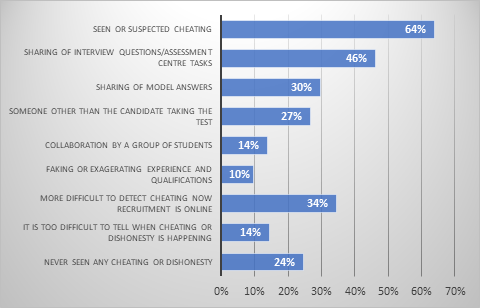Sophie Meaney (Amberjack) and Tristram Hooley (ISE) explore the issue of cheating in student recruitment.
Recruitment processes are designed to help employers to find the best person for the right job. We spend a lot of time on ISE Knowledge Hub talking about how to design recruitment and selection processes so that they are fair, efficient and offer a good candidate experience. But, none of this makes any sense if students cheat. So how can we avoid this happening, particularly in an age of increasingly virtual recruitment.
Amberjack and ISE have been working together to explore the issue of cheating in student recruitment. This month we ran a poll of ISE members to see how much of an issue it was. Most respondents (65%) reported that they had seen or suspected some cheating or dishonesty in student recruitment. With the overwhelming majority (89%) agreeing that it was important for students to demonstrate their honesty and integrity during the recruitment process. We will be holding a webinar on 9 September to explore how to address these issues in virtual and hybrid recruitment processes.
In their most recent Insight Paper Amberjack have explored some of the reasons why students may seek help with their application and argues that there are four main types of cheat.
- Naïve sharers. Students are used to publishing all elements of their lives on social media and contributing to user generated content and many view sharing interview questions or answers in a similar way.
- Casual cheats. Some students don’t set out to cheat, but they take opportunities to do so where they present themselves. For example, by tapping into any easily accessible information as part of preparing for your recruitment process.
- Malicious cheats. These students deliberately try to undermine your recruitment process and potentially to make money from it. This might include selling details of your process or sitting tests on behalf of others.
- Serious cheats. Will do anything to get a job, including paying for access to your materials/getting someone else to complete aspects of your process for them.
These different approaches to cheating chime with the messages that we are getting from ISE members about the types of cheating that they have seen or suspected.

Members reported that the most common form of cheating was the sharing of interview questions or assessment centre tasks (46%), the sharing of model answers (30%) or someone other than the candidate taking the test (27%). But, they also reflected that it was often difficult to spot cheating (14%) and noted that it was becoming more and more difficult as recruitment moves online (34%).
Thankfully, employers are not helpless in the face of student cheating. There are lots of things that can be done to reduce the space for cheating and increase the trust of all parties in the recruitment process. These include designing assessment tasks to make cheating more difficult, discussing the issue with students and using an identity verification system (e.g. passport and/or face scanning).
In the Happy Hybriding webinar we are going to discuss the issue of cheating in the increasingly virtual recruitment world. We’ll look at how employers can challenge the cheats and make use of cutting-edge technologies to ensure that processes are trustworthy and robust.


0 Comments